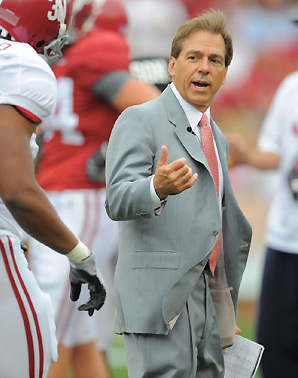Alabama sanctions show NCAA won't slaughter its cash cows
That isn't to say that Alabama's football program deserved a stiffer penalty in this case. Unlike when the Crimson Tide purchased a defensive tackle like a heifer at a livestock auction at the beginning of this decade, this crime didn't merit severe sanctions. The currently-on-appeal case of widespread academic fraud at Florida State might have, but the Seminoles lost a few scholarships and wouldn't give a flip about the wins they have to vacate except for the fact that those wins belong to Bobby Bowden, who may or may not be racing Penn State's Joe Paterno for the title of winningest coach in Division I-A history. And when (if?) the NCAA finishes its investigation into the allegations against former USC tailback Reggie Bush, don't be shocked if the Trojans receive a mere speedbump of a penalty -- even if every allegation turns out to be true.
Like New Mexico this year and New Jersey in 2007, it seems the NCAA has banned the death penalty. For the nation's marquee programs, 25-to-life probably is out as well. Stripping a handful of scholarships over three or four years and forcing the vacation of wins, the NCAA disciplinary equivalent of serving a 30-day jail sentence on weekends, is about the harshest penalty the once-feared Committee on Infractions will hand down to a name-brand football program.
So forget bowl bans. Forget the TV ban, the NCAA's version of the atomic bomb. NCAA leaders, representatives of the schools themselves, understand now that it's bad for business to slaughter the cash cows, even if some of those cows occasionally cheat on tests or take money from agents.
Let's hop in the time machine and travel back to 1987. The Bangles taught everyone to Walk Like an Egyptian. Cliff Huxtable dispensed wisdom to Theo and Rudy every Thursday, and Sam Malone served drinks and chased skirts an hour later. Also, the NCAA canceled Southern Methodist's football season. You read that correctly, under-25 fans. The NCAA wiped a big-name program off the face of the Earth for a season. The NCAA also added the following sanctions against the Mustangs:
• They could play only seven games, none at home.
• They would be allowed 15 scholarships.
• They were allowed only five assistant coaches.
• They were banned from television and from bowls.
SMU didn't even bother playing in 1988, choosing instead to field a roster of freshmen and practice for 1989.
Now, just imagine if the NCAA issued even one of those penalties to USC as a result of the Bush investigation. The heads of programming at ESPN/ABC and Fox Sports Net would suffer simultaneous heart attacks. If the Pac-10 was in the midst of negotiating a new TV deal, it would have to take significantly less money, hurting the conference's other nine schools. The same would go for a similar penalty against Alabama. In fact, the money involved has grown so much that had the Albert Means scandal occurred last year, the NCAA probably wouldn't have slapped Alabama with a bowl ban and a 21-scholarship reduction. The Crimson Tide's probation for the textbook case actually leaves Alabama open for the death penalty, but it's highly unlikely the committee would take so drastic a step even if 'Bama ran afoul of the rules again. Alabama -- or Florida or LSU or Tennessee -- is simply too valuable a commodity. During the next 15 years, CBS and ESPN/ABC will pay a combined $3 billion to televise SEC sports. If those networks couldn't televise Alabama-LSU or Florida-Tennessee, they might ask for a refund. When punishing Alabama also hurts Auburn and Mississippi State, the NCAA can't afford to throw the book at an offender.
Shortly before the NCAA revealed the penalties, a reporter from The Birmingham News caught up with Alabama coach Nick Saban and asked how Saban felt about finally putting this episode behind the program. "I'm really happy for the players we have in the program that this won't affect their future, nor will it affect the players we're recruiting," Saban told the paper. "We're always happy to be moving on, and we're looking forward to the future."
Maybe Pete Carroll should keep a copy of that quote to use the day the NCAA wraps the Bush investigation. Neither USC nor any other name-brand program that winds up in the NCAA's crosshairs should worry too much about suffering in the future. They're just too valuable to harm.





